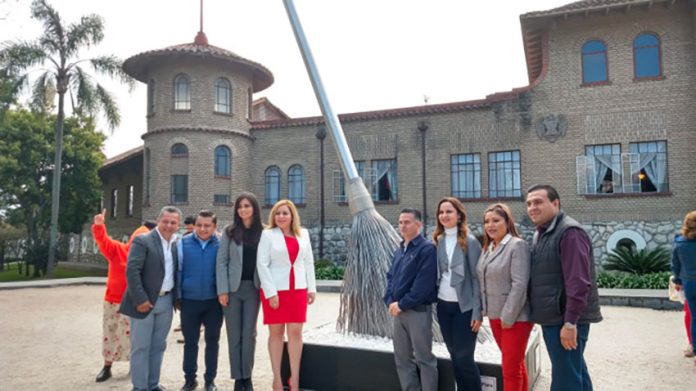This past weekend I visited Orizaba, recipient of the Spanish “Silver Broom” award for its cleanliness. It really was a site to behold: clear and modern stoplights and street indications, easily-visible lanes and arrows, very little graffiti, and new, readable street signs, many of which had explanations of why the names had been given in the first place.
As the birthplace of Francisco Gabilondo Soler (famously known as the singer Cri-Cri), the city center is filled with well-maintained statues from his songs (some admittedly fairly racist — clearly, not all cultural cornerstones from the 30s and 40s have aged well).
The Alameda park was filled with an assortment of sturdy playgrounds made from recycled material — even one for dogs! Another kid-friendly park features life-sized dinosaur statues, and is definitely worth the visit if you can keep the inexplicably-placed giant crucifix from scaring your heathen children.
There’s a river walk that doubles as a zoo with an impressive number of animals, cable cars that seem to float over the city as they travel back and forth from the center to a nearby mountain, and plenty of tourist information placed throughout the city.
The food wasn’t fabulous, but I guess you can’t have it all.
My own city of Xalapa could certainly learn a few things from Orizaba, as could many other communities. While ambitious projects are often started enthusiastically here, the enthusiasm, or perhaps the budget, seems to die down quite quickly.
A handful of streets in and around my neighborhood, for example, were torn up completely in what seemed like less than a day, and have stayed that way for the better part of several months. Vertical gardens are erected, then left to die and wilt. New potholes appear with each heavy rain, which is a problem in a city with an average rainfall of 1,587 millimeters a year.
The intentions are good, but it seems we forget that a city is a living thing, and needs constant care and maintenance.
Part of the problem, I believe, is that urban planning is controlled by a hodgepodge of entities, all the way up to the federal level. But as anyone who’s worked in a large organization knows, when several branches are in charge of one area, things tend to slip through the cracks and misunderstandings about what things are whose responsibility abound.
Corruption is obviously also part of the problem, as evidenced by the abundance of half-bridges that go nowhere and have been overgrown by plants in a truly post-apocalyptic style. Well-intentioned efforts like a tree-planting initiative have shown major problems with oversight, and cases in which billions of pesos are spent on projects that never materialize or go way over budget and time are well-documented.
As the case of Orizaba shows, most urban planning and maintenance is best done by the people who actually live in the communities, as they know best the unique needs of each place. And while huge infrastructure projects can be a boon to local and national economies, the devil really is in the details.
So with no further ado, the simple lessons learned on this last trip to Orizaba:
Prevent accidents by maintaining roads and ensuring that everyone knows how to drive at all times with clear indications. First and foremost, streets must be constructed in the first place to last. We now have the technology to do just that, with recycled tires no less! Add to these clearly painted lanes, arrows that show the options for where to go when you get to the end of the block, large and clear street signs, and functional stoplights whose sensors are regularly updated according to average traffic flows, and we’ve got a first-class road system!
Invest in lasting (and free) infrastructure for children. There was something old-fashioned about the playground equipment, though it was clean, safe and new. I couldn’t quite put my finger on it until I got closer and realized that it was recycled plastic painted to simply look like wood. The playgrounds were free, of course, as were the zoo and the dinosaur park. I think even the staunchest capitalist would agree that all children deserve safe places to play, and Orizaba was chock full of contented children.
Show pride in your community’s heritage. Not every city can be the birth place of Cri-Cri or that guy who did the Spanish voice of Homer Simpson (trust me, I know — I’m from Waco, Texas). But there’s always something that makes a place special, and calling attention to those things makes people proud not only to call it home, but to welcome others.
Maintain green spaces. Plants — especially plants native to the area — just make everything beautiful. The more, the merrier!
Keep things neat and painted. Even one house getting a new (or first) coat of paint can make such a difference. Painting is something that we can all work on together to keep our neighborhoods and communities beautiful. Comex regularly sponsors community painting projects, including murals, giving citizens a chance to really add personality to their communal spaces.
Real ownership of the community comes when we all take pride in where we live and work to make it functional, beautiful, and comfortable. Let’s take a page from Orizaba and get to work!
Sarah DeVries writes from her home in Xalapa, Veracruz.
